
Gennady Ivanovich Yanayev was a Soviet politician and disputed President of the Soviet Union for three days. Yanayev's political career spanned the rules of Khrushchev, Brezhnev, Andropov and Chernenko, and culminated during the Gorbachev years. Yanayev was born in Perevoz, Gorky Oblast. After years in local politics, he rose to prominence as Chairman of the All-Union Central Council of Trade Unions, but he also held other lesser posts such as deputy of the Union of Soviet Societies for Friendship and Cultural Relations with Foreign Countries.

Viktor Robertovich Tsoi was a Soviet singer-songwriter and actor who co-founded Kino, one of the most popular and musically influential bands in the history of Russian music.

Antanas Sniečkus was a Lithuanian communist politician who served as the First Secretary of the Communist Party of Lithuania from 15 August 1940 to 22 January 1974.

Viktor Vladimirovich Gerashchenko, nicknamed Gerakl, was the Chairman of the State Bank of the USSR, then Governor of the Bank of Russia during much of the Perestroika and post-Perestroika periods.

Viktor Antonovich Sadovnichiy is a Russian mathematician, winner of the 1989 USSR State Prize, and since 1992 the rector of Moscow State University. One of the main opinion leaders in Russia, Sadovnichiy has significant political and social influence.

The Stalin Bloc – For the USSR, known before January 1999 as the Front of the Working People, Army and Youth for the USSR, was a coalition of communist political parties in Russia running together for the 1999 elections of the State Duma.

Viktor Mikhailovich Chebrikov was a Soviet public official and security administrator and head of the KGB from December 1982 to October 1988.

Viktor Pavlovich Nogin was a Russian Bolshevik revolutionary, Soviet politician and statesman in Moscow, holding many high positions in the party and in government, including Chairman of the Moscow Military Revolutionary Committee and Chairman of the Presidium of the Executive Committee of Moscow Council of Workers' Deputies. He was a member of first Council of People's Commissars, i.e., the first Government of Soviet Russia, as People's Commissar for Commerce and Industry.

Chile–Russia relations are the bilateral foreign relations between Chile and Russia. The establishment of diplomatic relations between Chile and the USSR countries happened on December 11, 1944.
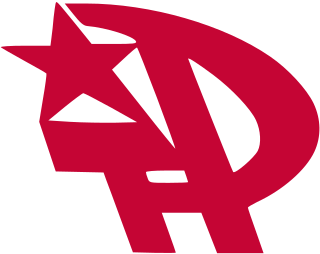
Labour Russia is a hard-line communist movement in Russia. It was established in 1992 by decision of the January 1992 plenum of the Russian Communist Workers Party (RKRP). The founding congress took place on 25 October 1992. Labour Russia was officially registered by the Ministry of Justice of the Russian Federation on 9 January 1996, then deregistered on 16 March 2004.
Democratic Russia was the generic name for several political entities that played a transformative role in Russia's transition from Communist rule. In 1991–1993, the Democratic Russia Movement was the largest political organization in the country and Boris Yeltsin's base of political support.
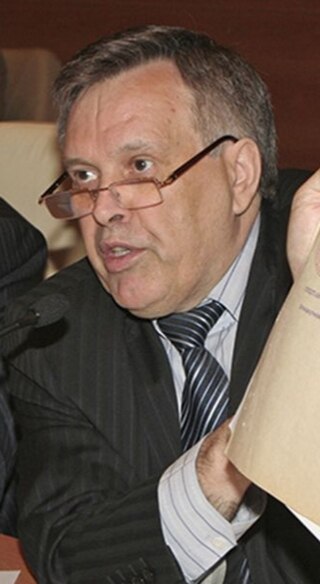
Viktor Ivanovich Ilyukhin was a Russian State Duma deputy, member of the Communist Party of the Russian Federation, Chairman of the State Duma Committee on security, member of the State Duma's anti-corruption committee, member of the State Duma committee to consider of the federal budget on the defense and security of the Russian Federation, and Chairman of the Movement in Support of the Army.

The Union of Soviet Socialist Republics (USSR) was formally dissolved as a sovereign state and subject of international law on 26 December 1991 by Declaration № 142-Н of the Soviet of the Republics of the Supreme Soviet of the Soviet Union. It also brought an end to the Soviet Union's federal government and General Secretary Mikhail Gorbachev's effort to reform the Soviet political and economic system in an attempt to stop a period of political stalemate and economic backslide. The Soviet Union had experienced internal stagnation and ethnic separatism. Although highly centralized until its final years, the country was made up of 15 top-level republics that served as the homelands for different ethnicities. By late 1991, amid a catastrophic political crisis, with several republics already departing the Union and Gorbachev continuing the waning of centralized power, the leaders of three of its founding members, the Russian, Belorussian, and Ukrainian SSRs, declared that the Soviet Union no longer existed. Eight more republics joined their declaration shortly thereafter. Gorbachev resigned on 25 December 1991 and what was left of the Soviet parliament voted to dissolve the union.
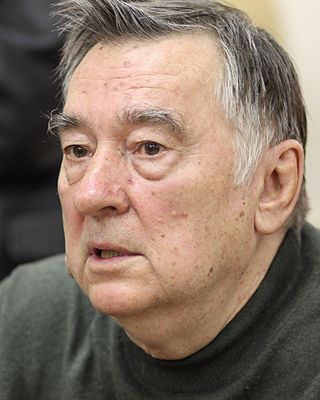
Alexander Andreyevich Prokhanov is a Russian writer, a member of the secretariat of the Writers Union of the Russian Federation, and the author of more than 30 novels and short story collections. He is the editor-in-chief of Russia's extreme-right newspaper Zavtra, that combines ultranationalist and anti-capitalist views.
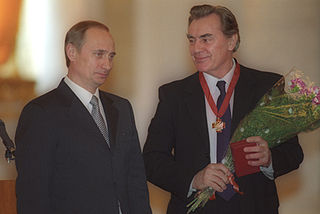
Viktor Ivanovich Korshunov was a Soviet and Russian stage and film actor, theater director and pedagogue. People's Artist of the USSR (1984).
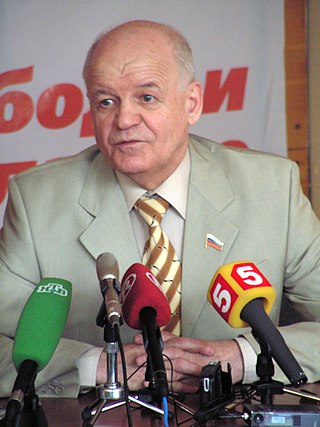
Viktor Ivanovich Cherepkov was a Russian naval officer and politician who was a Deputy of the State Duma of the third and fourth convocation. He was mayor of Vladivostok.
The 1996 Gennady Zyuganov presidential campaign sought to elect the leader of the Communist Party of Russia, Gennady Zyuganov as President of Russia in the 1996 presidential election.
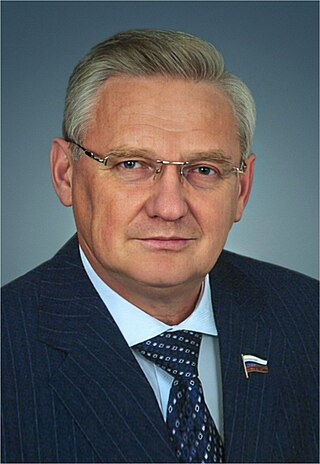
Viktor Evgrafovich Shudegov was a Russian scientist and politician. He served as Chairman of the Committee on Science, Culture, Education, Healthcare and Ecology of the Federation Council of the Federal Assembly of the Russian Federation, Deputy of the State Duma of the Federal Assembly of the Russian Federation, Deputy Chairman of the Education Committee of the State Duma of the Russian Federation, and Chairman of the Council of the regional branch of the "A Just Russia" party in the Udmurt Republic.

Vitaly Petrovich Mukha was a Ukrainian-born Russian politician, who served as the first and third Governor of Novosibirsk Oblast from 1991 to 1993 and from 1995 to 2000.
Viktor Ivanovich Korolev is a Russian singer and songwriter specializing in the Russian chanson music genre.
















